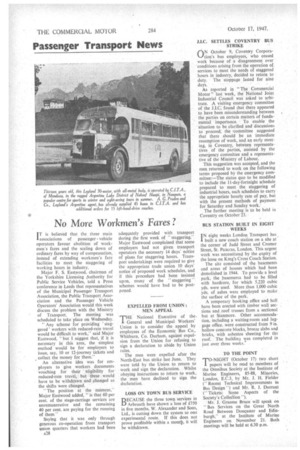No More Workmen's Fares?
Page 30

If you've noticed an error in this article please click here to report it so we can fix it.
I T is believed that the three main associations of passenger vehicle operators favour abolition of workmen's fares and the scaling down of ordinary fares by way of compensation, instead of extending workmen's fare facilities to meet the staggering of working hours in industry.
Major F. S. Eastwood, chairman of the Yorkshire Licensing Authority for Public Service Vehicles, told a Press conference in Leeds that representatives of the Municipal Passenger Transport Association, the Public Transport Association and the Passenger Vehicle Operators' Association would this week discuss the problem with the Ministry of Transport. The meeting was scheduled to take place on Wednesday.
" Any scheme for providing 'staggered' workers with reduced-rate travel would be difficult. to work," said Major Eastwood, "but I suggest that, if it is necessary in this area, the simplest method would be for employers to issue, say, 10 or 12-journey tickets and collect the money for them."
An alternative idea was for employers to give workers documents vouching for their eligibility for reduced-rate travel, but these would have to be withdrawn and changed as the shifts were changed.
"The position at the moment." Major Eastwood added, "is that 60 per cent, of the stage-carriage services are unremunerative and the remaining 40 per cent, are paying for the running of them " Saying that it was only through generous co-operation from transport union quarters that workers had been A28 adequately provided with transport during the first week of "staggering,'' Major Eastwood complained that some employers had not given transport operators the necessary 14 days' notice of plans for staggering hours. Transport undertakings were required to give the appropriate trade union 10 days' notice of proposed work schedules, and if this procedure had been insisted upon, many of the " staggering " schemes would have had to be postponed.












































































